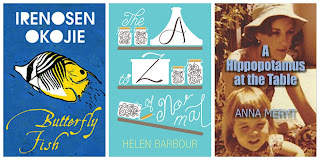This has created an ongoing conversation. You can see responses from the media here: The Guardian; Bookseller; Booktrade; The Publishers Association.
A survey of publishers and literary agents indicates that of the respondents over 74 percent of those employed by large publishing houses, and an alarming 97 per cent of agents, believe that the industry is only "a little diverse" or "not diverse at all." After reading these figures, Greenacre Writers decided something had to be done and along with writers and readers, organised a #diverseauthorday. And since then #DiverseDecember and now #ReadDiverse2016 has were launched.
Naomi Frisby was a guest editor for Fiction Uncovered where she asked: Do you ever reflect on the books you’re choosing to read? Naomi wrote about people with regional accents, the working class, BAME writers, the characters of the circus and the sideshow. 'What they all have in common', said Naomi, 'is that they’re outsiders. They’re not part of the dominant narrative; they exist beyond the mainstream.' You can read more here.
Alex Wheatle is the current guest editor for Fiction Uncovered where he has written The Bard on Hay, about his experience of attending the world famous Hay Festival. A seasoned author, Alex wonders whether he will be accepted by the white majority. He also wonders why more black novelists aren’t invited to Hay. You can read Alex's article here.
As well as Black and Asian authors there has also been a call for more diverse characters such as LGBTQ characters and disabled characters in literature.
More Diverse Conversations:
As well as Black and Asian authors there has also been a call for more diverse characters such as LGBTQ characters and disabled characters in literature.
More Diverse Conversations:
Huma Munshi started the #fuckhonour hashtag to express her anger at the oppression women have experienced. She is a writer, poet, blogger and trade unionist. She is a regular contributor to Media Diversified, F-Word and Time to Change. She has written widely on honour based violence, mental health, film and intersectionality. Her weekly column reflects her passion for activism, a feminism that reflects her own experiences as an Asian Muslim woman, film reviews and current affairs. Read more of her articles here.
Susan Barker grew up in east London. She studied philosophy at the University of Leeds and creative writing at the University of Manchester. Her two novels, Sayonara Bar (2005) and The Orientalist and the Ghost (2008), were both longlisted for the Dylan Thomas Prize. Her third novel, The Incarnations, will be published in the US on August 18. Susan questions: Should Ethnicity Limit What a Fiction Writer Can Write? Read it here.
Christina Fonthes is a Manchester-based translator, and Afrofeminist blogger. Born in Kinshasa, Congo and raised in London, she is an advocate for LGBTQ (Lesbian Gay Bisexual Transgender Queer) rights. She recently wrote an article for Media Diversified: Book list for black girls: promoting self-love and empowering young black women. Read it here.
Susan Nussbaum is a playwright. Her works have been produced at many theatres. In 2008 she was cited by the Utne Reader as one of “50 Visionaries Who Are Changing Your World” for her work with girls with disabilities. Nussbaum lives in Chicago. Good Kings Bad Kings is her first novel. She has written about disabled characters in fiction. Read more here.
Susan Nussbaum is a playwright. Her works have been produced at many theatres. In 2008 she was cited by the Utne Reader as one of “50 Visionaries Who Are Changing Your World” for her work with girls with disabilities. Nussbaum lives in Chicago. Good Kings Bad Kings is her first novel. She has written about disabled characters in fiction. Read more here.
Katharine Quarmby is a journalist, film-maker and disability rights campaigner. Most recently she has worked as an associate editor for Prospect magazine and written for the Economist. She has also worked as a producer on Panorama and Newsnight for the BBC and news-edited Disability Now. She has just published her first book, Scapegoat: Why We Are Failing Disabled People.
Lists:
The British Blacklist, lists male and female authors, screenwriters, playwrights, poets and songwriters. You can find out more about the amazing wealth of UK writers of colour here.
The Bookbag, has almost 12,000 book reviews and features books from all the many walks of literary life. There are also lots of author interviews, and all sorts of top tens - all of which you can find on their features page. You can read a collection of LGBT reviews here.
Vid-bloggers:
Jen Campbell, is the author of the Sunday Times bestselling, Weird Things Customers Say in Bookshops series, its sequel, More Weird Things Customers Say in Bookshops, and The Bookshop Book. Jen is also an award winning poet and short story writer. Jen has an Ectrodactyly, a congential disorder and often has to put up with ignorant comments! This has not stopped her being a beautiful person and lover of books. In this vid-blog, she shares her philosophy, how to Be a Good Human and how books make us a better person. We hear about some of her favourite #diverse books here.
This is just a tiny example of some amazing diverse conversations that are out in the world. Do join in the conversation today and share your amazing uniqueness, diverse authors and characters.
Use the hastag #readdiverse2016








